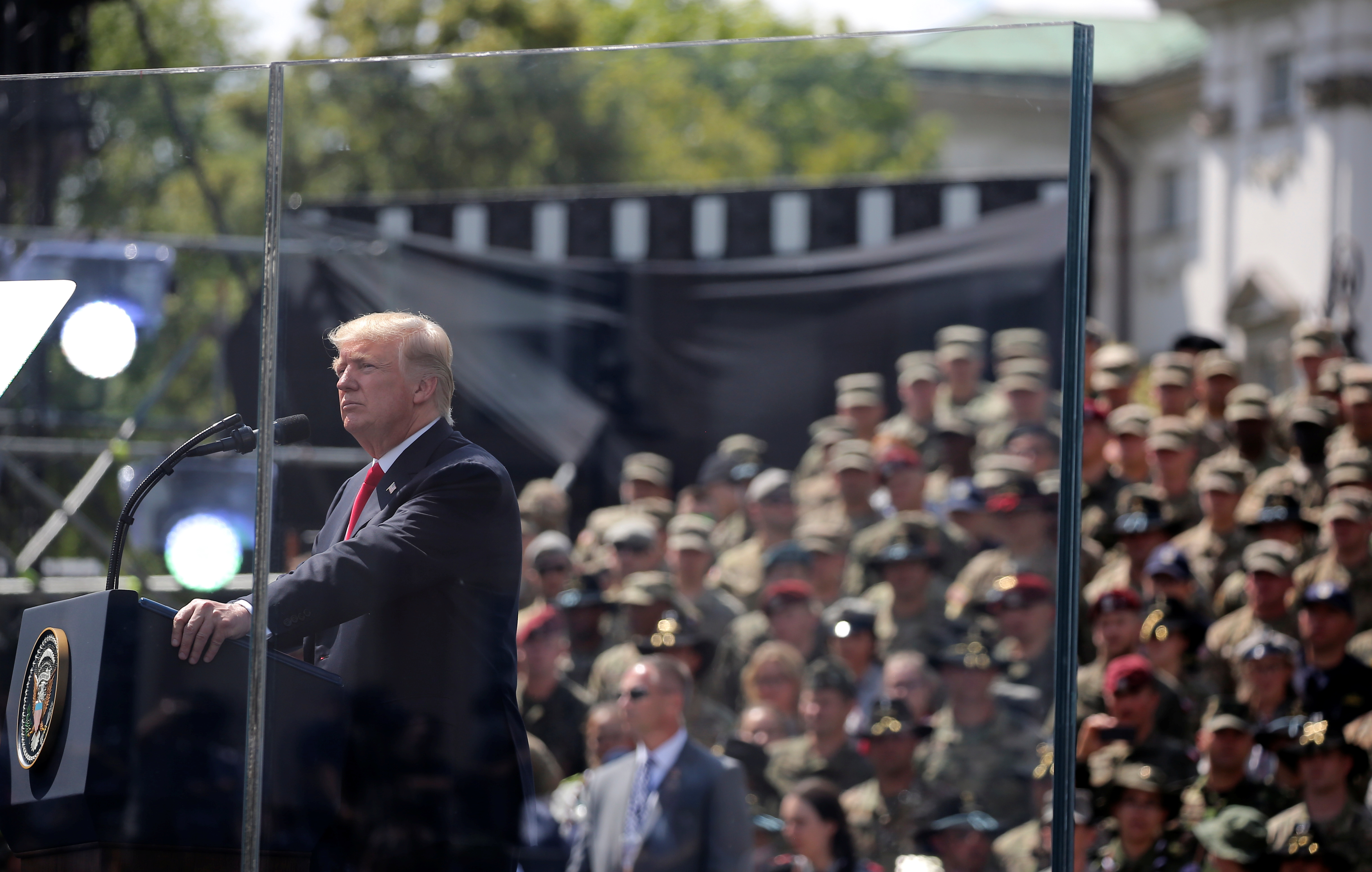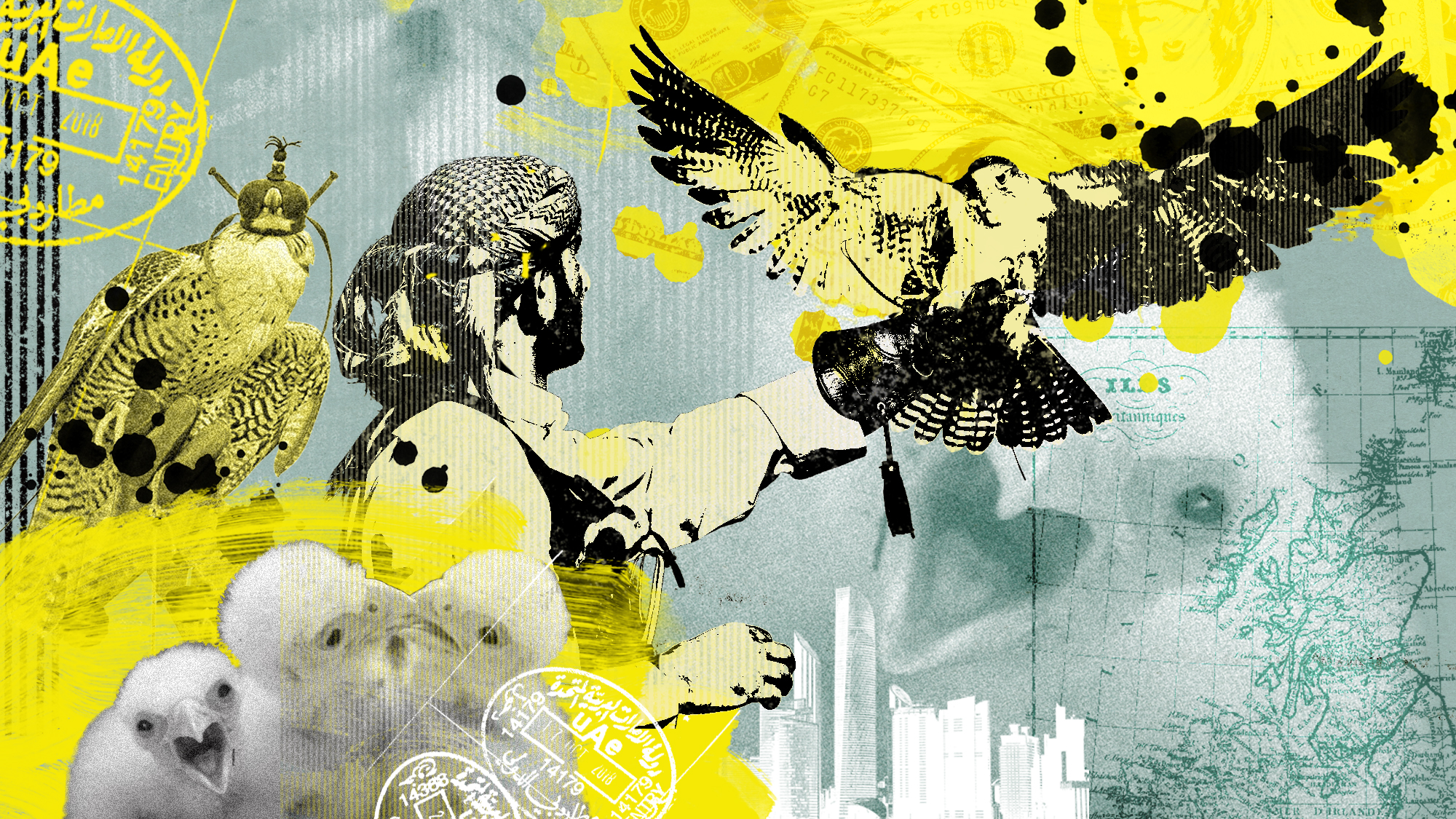Trump takes 'American carnage' global
On the president's dark speech in Warsaw


It has been more than five months since President Trump used his inauguration speech to paint an image of "American carnage" that could only be reversed by him alone. On Thursday, to great praise, he offered its direct sequel: "The fundamental question of our time is whether the West has the will to survive," Trump told the enthusiastic audience spread out before him in Poland's Krasinski Square.
Reportedly crafted by Trump's top speechwriter, Stephen Miller, the president's speech in Warsaw, with its rhetorical flourishes and catchy lines, was immediately recognizable as being what "the White House sees as one of the most important speeches of his presidency," Axios writes. The Weekly Standard's Bill Kristol reluctantly raved that "Trump's speech in Warsaw was an appropriate, even eloquent, speech worthy of a president speaking for America," using the hashtag #CreditWhereCreditIsDue. Trump critic Dan Rather agreed, calling the speech the "best of his presidency." Roger Kimball, writing for PJ Media, went even farther: "If you want to know why Donald Trump will go down in history as a great president," he said, "listen to (or read, when it is available) his speech in Krasinski Square, Warsaw, today."
But while Trump excluded the "America first" language of his inaugural speech while in Warsaw — the phrase "stings in places that aren't America," Axios wryly notes — the president's words on Thursday were no less ominous and nationalistic than those that followed his swearing in. The climax of the speech, which The New York Times deemed "dark and confrontational," is a frightening warning to America and its allies abroad:
The Week
Escape your echo chamber. Get the facts behind the news, plus analysis from multiple perspectives.

Sign up for The Week's Free Newsletters
From our morning news briefing to a weekly Good News Newsletter, get the best of The Week delivered directly to your inbox.
From our morning news briefing to a weekly Good News Newsletter, get the best of The Week delivered directly to your inbox.
The fundamental question of our time is whether the West has the will to survive. Do we have the confidence in our values to defend them at any cost? Do we have enough respect for our citizens to protect our borders? Do we have the desire and the courage to preserve our civilization in the face of those who would subvert and destroy it?
Trump's language echoes the worldview of his far-right advisers like Stephen Bannon, who embrace an "us against them" mindset where mutually beneficial coexistence between nations is impossible. Instead, the world is a battlefield. Sometimes, it's a literal battlefield: "Every foot of ground and every last inch of civilization is worth defending with your life," Trump told the crowd in Warsaw. And sometimes, it's a battlefield of ideas, one between "our minds, our wills, and our souls."
This siege on the West and its values, then, was practically inevitable. America, Trump believes, has long been snickered at by exploitative powers around the world and is now reduced to a trembling shadow of its former self, weakened by an onslaught of internal and external foes, perhaps lacking even the "will to survive." "We have become a laughingstock, the world's whipping boy, blamed for everything, credited for nothing, given no respect," Trump wrote in his book, Time to Get Tough! Making America #1 Again. "You see and feel it all around you, and so do I.”
Speaking in Warsaw, Trump expanded this dark vision of America to the entire Western world, referencing unnamed "forces" three times and drawing parallels to the Nazi and Soviet invasions of Poland. While Trump said the word "freedom" 15 times during his speech — "brave defenders of freedom," "bled and died for freedom," "demolish freedom" — he did not once speak of "democracy."
So who are these apocalyptic foes of which Trump speaks? "Radical Islamic terrorism," of course, makes an appearance. Russia and other unnamed "powers" are also cited, but never placed under any coherent ideological umbrella. The final enemy? "[T]he steady creep of government bureaucracy that drains the vitality and wealth of the people." It's a strange axis of evil.
A free daily email with the biggest news stories of the day – and the best features from TheWeek.com
But when Trump at last elaborated on the threats to the West, it was an erosion of "tradition" and "culture" that he seemed to find most alarming. The enemy is approaching, he claims, from "the South or the East," a linguistic echo of his executive orders to block Latin American immigrants as well as travelers from six supposedly high-risk, predominately Muslim countries from entering the United States.
"If left unchecked," Trump said, "these forces will undermine our courage, sap our spirit, and weaken our will to defend ourselves and our societies." But victory is assured if "we don't forget who are."
For some, that "we" is the great American melting pot of cultures, values, and traditions, but to Trump, the West is homogeneous. "We write symphonies," he offers as an explanation. "We pursue innovation. We celebrate our ancient heroes, embrace our timeless traditions and customs, and always seek to explore and discover brand-new frontiers." As far as definitions of the West go, this is nonsense. Nothing about playing music, celebrating heroes, embracing traditions and customs, exploring or even pursuing innovation makes the West unique — just ask the Chinese who invented gun powder. Instead, what Trump is doing is deliberately and explicitly rejecting whatever the "others" might bring to U.S. shores, and in saying so, he misses how American traditions were established in the first place.
It has been said that Trump has "no doctrine," or that his doctrine is putting "America first." On Thursday, Trump proved it to be something else entirely: A war against an undefined, and perhaps even nonexistent, "other."
"Our values will PREVAIL," Trump tweeted right after the rally, but at the expense of whose? "Our people will THRIVE and our civilization will TRIUMPH," but at what price? Beneath these grandiose words is the same selective worldview with which Trump began his term. Only now, it is a frightening prospect to imagine what he will have to say at the finish.
Editor's note: This article originally stated that Ronald Reagan's former speechwriter, Tony Dolan, reportedly helped craft Trump's speech. After Dolan told The Week he did not write the speech, this reference was removed.
Jeva Lange was the executive editor at TheWeek.com. She formerly served as The Week's deputy editor and culture critic. She is also a contributor to Screen Slate, and her writing has appeared in The New York Daily News, The Awl, Vice, and Gothamist, among other publications. Jeva lives in New York City. Follow her on Twitter.
-
 NASA discovered 26 microbes in their cleanrooms
NASA discovered 26 microbes in their cleanroomsUnder the radar The bacteria could contaminate space
-
 The elite falcon trade in the Middle East
The elite falcon trade in the Middle EastUnder the Radar Popularity of the birds of prey has been ‘soaring’ despite doubts over the legality of sourcing and concerns for animal welfare
-
 A running list of the international figures Donald Trump has pardoned
A running list of the international figures Donald Trump has pardonedin depth The president has grown bolder in flexing executive clemency powers beyond national borders
-
 The billionaires’ wealth tax: a catastrophe for California?
The billionaires’ wealth tax: a catastrophe for California?Talking Point Peter Thiel and Larry Page preparing to change state residency
-
 Bari Weiss’ ‘60 Minutes’ scandal is about more than one report
Bari Weiss’ ‘60 Minutes’ scandal is about more than one reportIN THE SPOTLIGHT By blocking an approved segment on a controversial prison holding US deportees in El Salvador, the editor-in-chief of CBS News has become the main story
-
 Has Zohran Mamdani shown the Democrats how to win again?
Has Zohran Mamdani shown the Democrats how to win again?Today’s Big Question New York City mayoral election touted as victory for left-wing populists but moderate centrist wins elsewhere present more complex path for Democratic Party
-
 Millions turn out for anti-Trump ‘No Kings’ rallies
Millions turn out for anti-Trump ‘No Kings’ ralliesSpeed Read An estimated 7 million people participated, 2 million more than at the first ‘No Kings’ protest in June
-
 Ghislaine Maxwell: angling for a Trump pardon
Ghislaine Maxwell: angling for a Trump pardonTalking Point Convicted sex trafficker's testimony could shed new light on president's links to Jeffrey Epstein
-
 The last words and final moments of 40 presidents
The last words and final moments of 40 presidentsThe Explainer Some are eloquent quotes worthy of the holders of the highest office in the nation, and others... aren't
-
 The JFK files: the truth at last?
The JFK files: the truth at last?In The Spotlight More than 64,000 previously classified documents relating the 1963 assassination of John F. Kennedy have been released by the Trump administration
-
 'Seriously, not literally': how should the world take Donald Trump?
'Seriously, not literally': how should the world take Donald Trump?Today's big question White House rhetoric and reality look likely to become increasingly blurred
